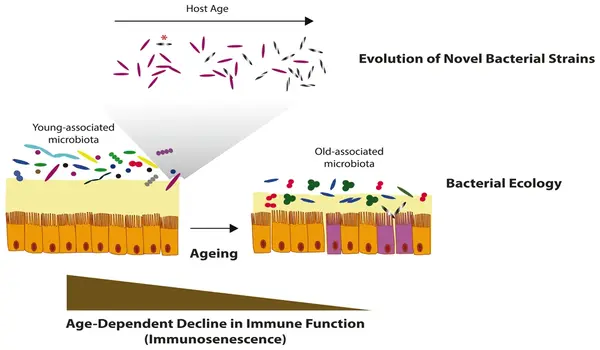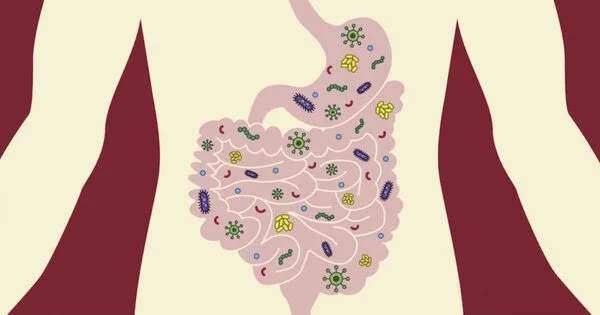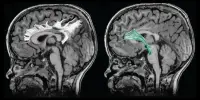Although this is a new field of study, research has shown that adversity and stress might potentially impact the gut microbiota throughout generations. More research is needed to completely understand the processes and ramifications of this phenomena.
According to a new study, the composition of their 2-year-old children’s gut microbiota reflects difficulties faced by women throughout their own childhood or during pregnancy. It was previously recognized that prenatal stress affects rat microbiomes into adulthood, but it was unknown how long the effects remained in humans after delivery. Changes in this microbe community are most likely one of the ways that adversity influences a child’s socioemotional development.
According to an international team of scientists lead by UCLA psychologists, the composition of their 2-year-old children’s gut microbiomes reflects hardship experienced by mothers throughout their own childhood or during pregnancy.
The researchers discovered minor to moderate changes in the children’s microbiomes. The study is the first to show how adversity affects the human gut microbiome across generations.
The microbiome gets a lot of attention and is very exciting, but it really is just one piece of the large and complicated puzzle of human health. Our research contributes to a growing body of evidence on the effects of early exposure and transgenerational experience on the microbiome.
Bridget Callaghan
An increasing body of evidence connects the gut microbiome to brain and immunological functioning, and the researchers believe that alterations in that community of bacteria are one of the ways that adversity affects children’s socioemotional development.
The study, published in the Proceedings of the National Academy of Sciences, builds on prior rodent research that shown that prenatal stress affects maternal vaginal and gut microbiomes. Because kids receive their initial gut microorganisms while passing through their mother’s birth canal, mothers’ microbiomes create the foundation of their offspring’s.
Previous human study has demonstrated that stress experienced by the newborn in the womb, as well as the mother’s own psychological anguish, alter the neonatal microbiome shortly after delivery. While scientists knew that the impacts of prenatal stress on rodent microbiomes lasted into adulthood, they didn’t know how long the disruptions lasted in humans or if they affected the following generation.
The study investigated the consequences of maltreatment to mothers during their childhoods, anxiety while pregnant and their children’s exposure to stressful life events in 450 mother-child pairs in Singapore when the children were 2 years old. The researchers asked mothers to recall abuse, neglect or other maltreatment they experienced during childhood, and mothers were screened for anxiety during the second trimester of pregnancy.

Researchers also interviewed the children’s primary caregivers to learn about stressful events the children had experienced, as well as their general behavior and health throughout their first two years of life, and stool samples were taken from the youngsters. The researchers took into account family wealth, which is sometimes used as a proxy for early trauma.
Children whose moms reported higher levels of worry during pregnancy had microbiomes in which the species of microbes had populations of similar sizes, a metric biologists call “evenness,” which had not before been discovered. The populations of the numerous species that comprise the gut microflora are typically “lumpier,” with some species being prevalent and others being less common. However, in the study sample, those disparities were less pronounced, and the populations were similar in size.
The gut bacteria of children who had stressful life experiences after birth also exhibited less genetic diversity, indicating that the microbes living in each child’s gut were more closely connected to each other than such microbes are normally. While more adversity was associated with less microbial genetic diversity in each child, the degree of adversity did not appear to influence how similar children’s gut microbiomes were to each other. There was still some diversity among the kids.
“There are lot of questions around whether more diversity or evenness is better or worse when the gut microbiome is developing during childhood, so we don’t know if more is better at 2 years old,” said Francesca Querdasi, a UCLA doctoral student and the paper’s lead author.
“But many of the species we found to be related to adversity are known to interact with the immune system in some way, suggesting that maybe the way the gut microbiome interacts with the immune system is different after adversity. There’s a lot that we need to explore in the future.”
The researchers also discovered various types of behavioral and mental health issues linked to an abundance of particular species in the gut microbiome. Although none of those species were connected with adversity in this analysis, the authors observed that some have been associated with adversity in previous studies and may perform comparable activities as the adversity-related species.
The brain-gut microbiome relationship develops rapidly during the first two to three years of life, and the changes caused by adversity reported in the new study are expected to have some influence on children’s socioemotional development.
A nascent area of study called nutritional psychiatry, which researches how changes to diet could affect mental health, is developing as scientists learn more about the brain-gut microbiome connection.
“The microbiome gets a lot of attention and is very exciting, but it really is just one piece of the large and complicated puzzle of human health,” said Bridget Callaghan, the paper’s principal author and a UCLA assistant professor of psychology.
“Our research contributes to a growing body of evidence on the effects of early exposure and transgenerational experience on the microbiome.” When we understand how adversity affects the gut microbiome, we can alter diet, vitamins, and lifestyle to have a favorable impact on an individual’s gut microbiome and overall developmental trajectory.”















